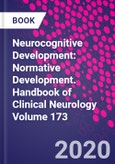This is one of a two-volume work on neurocognitive development, focusing separately on normative and non-normative development. The normative volume focuses on neurology, biology, genetics, and psychology of normative cognitive development. It covers the development of intellectual abilities, visual perception, motor function, language, memory, attention, executive function, social cognition, learning abilities, and affect and behavior. The book identifies when and how these functions develop, the genetics and neurophysiology of their operation, and their evaluation and assessment in clinical practice.
This book will serve as a comprehensive reference to researchers in cognitive development in neuroscience, psychology, and medicine, as well as to clinicians and allied health professionals focused on developmental disabilities (child neurologists, pediatric neuropsychologists, child psychiatrists, speech and language therapists, and occupational therapists.)
Table of Contents
Section I. Introduction to Neurodevelopmental Disabilities 1. Description and classification of neurodevelopmental disabilities 2. Neurodevelopmental and cognitive disabilities: Historical overview 3. Ethical views and considerations Section II. Biological Basis of Typical Neurodevelopment 4. Neurogenesis, neuronal migration and axon guidance 5. Development of neuronal circuits: From synaptogenesis to synapse plasticity 6. Myelination Section III. Plasticity, Vulnerability and Evolutionary Constraints of the Developing Brain 7. Early brain plasticity: Definitions and theoretical concepts 8. Resilience 9. Critical periods of brain development 10. Vulnerability of immature brain 11. Hemispheric specialization Section IV. Neuroscientific Basis of Typical Functional Neurodevelopment 12. Intellectual abilities 13. Visual development 14. The development of auditory functions 15. Motor functions 16. Typical language development 17. Literacy acquisition: Reading development 18. Memory: normative development of memory systems 19. Developing attention in typical children related to disabilities 20. Executive functions 21. Learning abilities 22. Social cognition 23. The role of cerebellum in the child neuropsychological functioning Section V. Etiologies of Neurodevelopmental Disorders 24. Genetic mechanisms of neurodevelopmental disorders 25. The effects of sex on prevalence and mechanisms underlying neurodevelopmental disorders 26. Impact of prematurity on neurodevelopment 27. Pregnant women, prescription and fetal risk 28. Effects of prenatal alcohol and cannabis exposure on neurodevelopmental and cognitive disabilities 29. Maternal infections 30. Environmental toxic agents: The impact of heavy metals and organochlorides on brain development 31. The effects of socio-affective environment 32. Traumatic brain injury and baby shaken syndrome 33. Ischemic sequalae and other vascular diseases








